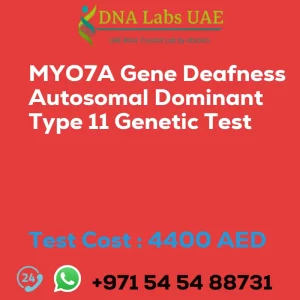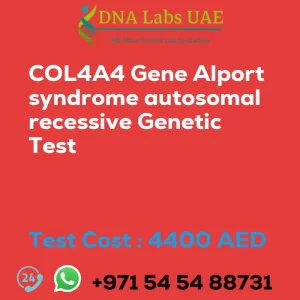CEACAM16 Gene Deafness Autosomal Dominant Type 4B Genetic Test
At DNA Labs UAE, we offer the CEACAM16 Gene Deafness autosomal dominant type 4B Genetic Test for individuals who are experiencing hearing loss. This genetic test can help diagnose and provide information about the specific genetic mutation causing the hearing loss.
Test Details
The CEACAM16 Gene Deafness, autosomal dominant type 4B is a genetic disorder characterized by hearing loss that is inherited in an autosomal dominant manner. This means that an affected individual has a 50% chance of passing on the condition to each of their children.
NGS (Next Generation Sequencing) Genetic Testing is a type of genetic test that uses advanced sequencing technology to analyze multiple genes simultaneously. In the case of CEACAM16 Gene Deafness, autosomal dominant type 4B, NGS Genetic Testing can be used to identify any mutations or variations in the CEACAM16 gene that may be responsible for the hearing loss.
The CEACAM16 gene provides instructions for making a protein called carcinoembryonic antigen-related cell adhesion molecule 16. This protein is involved in cell adhesion and plays a role in the development and maintenance of the inner ear, which is crucial for hearing.
Test Components
- Price: 4400.0 AED
- Sample Condition: Blood or Extracted DNA or One drop Blood on FTA Card
- Report Delivery: 3 to 4 Weeks
- Method: NGS Technology
- Test Type: Ear Nose Throat Disorders
- Doctor: ENT Doctor
- Test Department: Genetics
Pre Test Information
Prior to undergoing the CEACAM16 Gene Deafness autosomal dominant type 4B Genetic Test, it is important to provide the clinical history of the patient. This includes information about any family members affected with SLC52A3 Gene Brown-Vialetto-Van Laere syndrome 1, as well as a genetic counseling session to draw a pedigree chart.
Benefits of Genetic Testing
NGS Genetic Testing for CEACAM16 Gene Deafness, autosomal dominant type 4B can help diagnose individuals with this condition and provide valuable information for genetic counseling and family planning. Additionally, the results of this test can potentially contribute to the development of targeted therapies or interventions in the future.
At DNA Labs UAE, we are dedicated to providing accurate and reliable genetic testing services. Contact us today to schedule your CEACAM16 Gene Deafness autosomal dominant type 4B Genetic Test.
| Test Name | CEACAM16 Gene Deafness autosomal dominant type 4B Genetic Test |
|---|---|
| Components | |
| Price | 4400.0 AED |
| Sample Condition | Blood or Extracted DNA or One drop Blood on FTA Card |
| Report Delivery | 3 to 4 Weeks |
| Method | NGS Technology |
| Test type | Ear Nose Throat Disorders |
| Doctor | ENT Doctor |
| Test Department: | Genetics |
| Pre Test Information | Clinical History of Patient who is going for SLC52A3 Gene Brown-Vialetto-Van Laere syndrome 1 NGS Genetic DNA Test. A Genetic Counselling session to draw a pedigree chart of family members affected with SLC52A3 Gene Brown-Vialetto-Van Laere syndrome 1 NGS Genetic DNA Test gene SLC52A7 |
| Test Details |
CEACAM16 Gene Deafness, autosomal dominant type 4B is a genetic disorder characterized by hearing loss that is inherited in an autosomal dominant manner. This means that an affected individual has a 50% chance of passing on the condition to each of their children. NGS (Next Generation Sequencing) Genetic Testing is a type of genetic test that uses advanced sequencing technology to analyze multiple genes simultaneously. In the case of CEACAM16 Gene Deafness, autosomal dominant type 4B, NGS Genetic Testing can be used to identify any mutations or variations in the CEACAM16 gene that may be responsible for the hearing loss. The CEACAM16 gene provides instructions for making a protein called carcinoembryonic antigen-related cell adhesion molecule 16. This protein is involved in cell adhesion and plays a role in the development and maintenance of the inner ear, which is crucial for hearing. NGS Genetic Testing for CEACAM16 Gene Deafness, autosomal dominant type 4B can help diagnose individuals with this condition and provide information about the specific genetic mutation causing the hearing loss. This information can be used for genetic counseling, family planning, and potentially for the development of targeted therapies or interventions in the future. |








